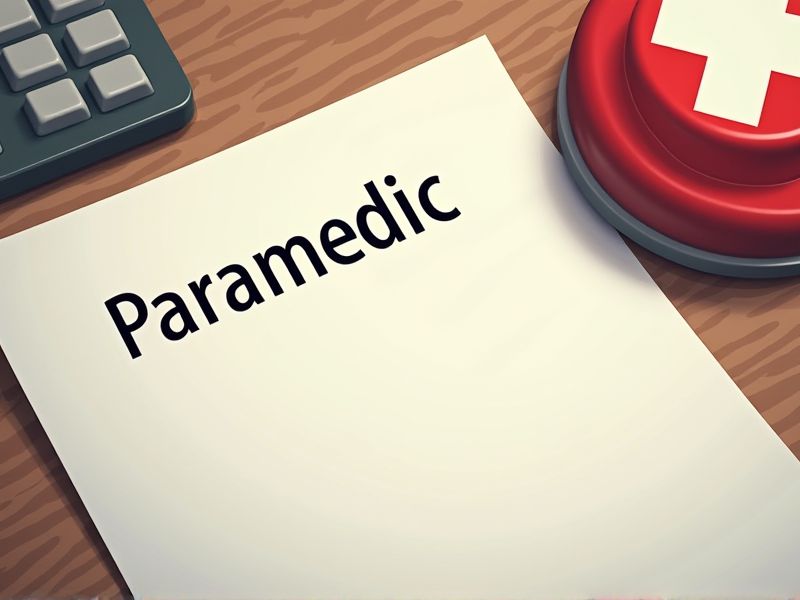
Paramedics face high-pressure situations that demand quick, informed decisions, and this necessity drives the requirement for specific certifications. Certifications ensure that paramedics possess the essential skills and knowledge to handle emergency medical scenarios effectively. Regulatory standards and patient safety protocols make these certifications crucial to maintain a high quality of care. Here are some key certifications essential for becoming a paramedic.
National Registry of Emergency Medical Technicians (NREMT) Certification
The NREMT Certification for paramedics standardizes qualifications, ensuring they meet national competency levels. This certification fosters public trust by verifying that paramedics possess necessary skills for emergency situations. Many states require NREMT Certification as part of the licensing process to align with regulatory compliance. Continuous certification through NREMT also promotes ongoing professional development and updated medical knowledge.
Paramedic Certification
Acquiring paramedic certification is essential as it establishes a standardized baseline of knowledge and skills required to handle emergency medical situations effectively. Certification ensures paramedics meet regulatory requirements, which strengthens public trust and enhances patient safety. It provides a framework for continuous education, helping paramedics stay updated with the latest medical advancements and protocols. Certified paramedics often experience better job prospects and career advancement opportunities due to their validated competence and professionalism.
Emergency Medical Technician (EMT) Certification
EMT certification is required for paramedics because it lays the foundational knowledge and skills in emergency medical care. It ensures that aspiring paramedics grasp the basic concepts of patient assessment, airway management, and CPR before advancing to more complex procedures. The certification serves as a standardized benchmark, ensuring consistency and quality across the healthcare system. By completing EMT certification, future paramedics demonstrate their commitment to rigorous training, which is critical for effective emergency response.
Basic Life Support (BLS) Certification
Basic Life Support (BLS) Certification ensures paramedics have the fundamental skills to perform CPR effectively, which directly impacts patient survival rates during cardiac arrest. It standardizes the initial response to life-threatening situations, promoting consistent, high-quality care across varied emergency scenarios. Obtaining BLS certification demonstrates a paramedic's commitment to maintaining essential competencies necessary in high-pressure environments. Ongoing certification keeps paramedics updated on current guidelines and best practices, directly influencing their readiness to handle emergencies with confidence.
Advanced Cardiac Life Support (ACLS) Certification
Paramedics require Advanced Cardiac Life Support (ACLS) certification to effectively handle life-threatening cardiac emergencies, as this training provides them with the necessary skills to assess and treat patients experiencing severe heart conditions. ACLS certification equips paramedics with knowledge in pharmacology and advanced airway management, essential for improved patient outcomes during critical situations. Most healthcare facilities mandate ACLS certification to ensure that paramedics meet high-level competency standards in emergency cardiovascular care. Having ACLS certification enhances collaboration within emergency medical teams, allowing paramedics to work seamlessly with other healthcare professionals during resuscitation efforts.
Pediatric Advanced Life Support (PALS) Certification
PALS certification equips paramedics with the skills necessary to recognize and manage critically ill infants and children, improving survival rates. Enhanced knowledge in pediatric assessment and treatment ensures timely interventions, reducing risks of complications. Comprehensive training in life-threatening pediatric emergencies decreases medical errors in high-pressure situations. Certification standardizes the quality of emergency care, fostering confidence among healthcare professionals and families.
Prehospital Trauma Life Support (PHTLS) Certification
Paramedics encounter high-pressure situations where quick, effective trauma management saves lives; PHTLS certification equips them with the skills to make critical decisions and efficiently manage injuries. Research indicates that structured, evidence-based training improves patient outcomes by reducing preventable deaths and complications. Standardized PHTLS protocols ensure consistency in care, which enhances collaboration among emergency responders and hospital teams. Medical advancements and evolving best practices make regular updates essential, and PHTLS certification keeps paramedics current with the latest trauma care techniques.
CPR Certification
Acquiring a CPR certification is essential for paramedics, as it equips them with life-saving skills vital during cardiac emergencies. CPR training ensures paramedics can effectively perform resuscitation, thereby increasing a patient's survival chances. It provides standardization of care, ensuring all paramedics adhere to the same guidelines during critical situations. Many employers and state regulations mandate CPR certification as a prerequisite for employment within emergency medical services.
Hazardous Materials (HAZMAT) Awareness Certification
Paramedics often encounter environments with potential hazardous material exposure, which necessitates understanding about identifying and managing such situations. HAZMAT Awareness Certification equips them with knowledge to recognize hazardous substances and understand their effects on health and safety. This certification enhances their ability to respond effectively and prioritize safety measures during emergencies with hazardous materials. Proper training reduces the risk of contamination and injury, ensuring safety for both paramedics and the public.
Mass Casualty Incident (MCI) Management Certification
Mass Casualty Incident (MCI) Management Certification equips paramedics with crucial skills to efficiently manage overwhelming situations, which directly improves patient outcomes during large-scale emergencies. Such certification trains paramedics to prioritize care and allocate resources effectively, minimizing loss. By mastering MCI protocols, paramedics enhance their readiness and communication with other emergency responders. This specialized training limits chaos and increases coordination, which significantly reduces response times.
Summary
When you obtain additional certifications as a paramedic, your career prospects significantly improve. Increased credentials enable access to specialized roles and higher-paying positions. This elevation in skillset often results in enhanced patient care. Healthcare organizations value your expertise more, leading to better job security and professional growth.
